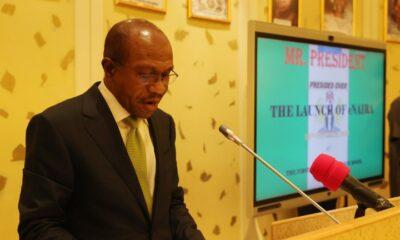If the Central Bank of Nigeria (CBN) had known that redesigning the N1000, N500 and N200 notes could threaten the economy of the nation as it appears, maybe it would have had a second thought or plan the policy better.
Since the redesign policy came to operation, it has been a litany of woes, not only to the financial institutions in the nation, but to the Small and Medium Scale Enterprises and Businesses.
Checks by Investors King showed that since the scarcity of Naira notes has bedeviled the country, average Nigerians who have accounts at various commercial banks have been left frustrated while some who appeared to have been pushed to the wall, have launched attacks on some banks in some parts of the country.
In Ibadan, some angry bank customers attacked some banks and destroyed Automated Teller Machines (ATMs), vehicles owned by bankers and customers alike because of the inability of the banks to release cash to them.
Notwithstanding the threat of sanctions by the nation’s apex bank, cases of alleged naira hoarding has not abated across the country as revelations of bank managers allegedly hoarding new notes have been hitting the public in torrents.
Officials of CBN had exposed some culpable bank officials and warned them against unethical practices. Also, operatives of the Economic and Financial Commission (EFCC) and Independent Corrupt Practices and Other Related Offences Commission (ICPC) have arrested some bank managers and other principal officers in some parts of the country for allegedly hoarding tye redesigned notes.
Nonetheless, the nation still battles cash scarcity as banks continue to witness crowd of customers who make frantic efforts, even to the point of fighting and engaging in chaos, to withdraw their money.
Apprehensive of customers’ wrath, Investors King gathered that banks’ officials have now improvised a new way of leaving the bank premises without being noticed by angry customers who have refused to the financial institutions environments even after close of work.
In Asaba, Delta State, some bank workers were seen scaling through fence when they could not make cash available for customers who had already been held stranded at the entrance.
While some Nigerians have accused Point of Sales operators of extorting them whenever they want to transact, the operators have justified their acts of increasing their charges.
Operators now charge between N500 and N1000 for N5,000 withdrawal across the country.
Some of the operators who confided in Investors King claimed that they had to pay or in some cases buy the new notes from banks officials, citing these as reasons for the increased charges.
Others said they had to tip some Nigerians to get the money in their through ATMs before they could get money to do business with.
A POS operator who simply identified himself as Adex said, “people should not blame us much because since this naira scarcity started, we go through a lot to get cash to do business with. Sometimes, I have to get my friends’ ATM cards so that I can withdraw the sum of N20000 which is the daily limit of withdraw in order to have enough cash to do business with.
“There is no way I will get ATM cards of people and borrow their money for business that I won’t give them some amount of money. So, the charges that we are collecting are part of the means of settling those whom we have already given tips. My other colleagues have to buy the naira from some bankers before they could work. Those who can’t go through all these things have closed their businesses,” he said.
As a result of failure to get cash, no fewer than 50 per cent of PoS operators have closed their shops.
The National Chief Aggregating Officer of the Association of Mobile Money and Bank Agents in Nigeria, Hussein Olanrewaju, stated that the impact of the ongoing shortage of new and old naira notes had worsened the conditions of their members.
Hussein noted that the ongoing policy meant to swap cash in unbanked areas might not achieve its mandate due to the low number of agents selected for the scheme.
He added that including more agents remained the best solution to easing the financial stress Nigerians were currently facing.
Meanwhile, proferring a headway to the crisis,, Vice President Yemi Osinbajo called on major players in the FinTech space wade in.
Some Civil Societies Coalition and Peoples Advocates have called on President Muhammadu Buhari and the Central Bank of Nigeria to be sensitive to the plights of citizens and arrest the ugly trend.
In their separate interviews, the leaders of the civil societies threatened to mobilise Nigerians in nationwide protest against scarcity of Naira as they lamented that small businesses were already shutting down.
The chairman of Osun Civil Societies Coalition, Waheed Lawal and the Publicity Secretary of Peoples Advocates, Emmanuel Olowu, decried the current hardship Nigerians are battling and informed Buhari that the nation is falling apart under his administration and that if nothing urgent was done to arrest the torturous situation, they would mobilise mass protest in the state.
Lawal said, “While we are not questioning the sincerity of the Federal Government on the financial policy, we are constrained to give volume to the murmuring, groaning and cries of Nigerians who have been badly hit by the economic dragon. Considering the pains being experienced by the common men in getting cash for their livelihood, it would not be out of place to declare that the President Muhammadu Buhari-led Federal Government is inconsiderate and insensitive to the plight of the citizens.
“The Central Bank of Nigeria led by Mr Godwin Emefiele has clearly been playing hide-and-seek game on the circulation of the new naira notes. We acknowledged the fact that there are saboteurs among the top echelon of the banking industries, but the CBN has not also released enough amount of the redesigned denominations to banks through which they can be disbursed to the generality of people. This is responsible for the ridiculous amount of cash being paid to the people over the counter.”
According to Olowu, the redesigning of the naira has turned to unjust punishment for Nigerians, adding that many small scale businesses have collapsed due to cash scarcity.
“Economically, the scarcity of cash has crippled many businesses and further push millions of Nigerians far below the poverty line. Petty traders do no longer make sales because of cash transaction which their trading depends upon. We make bold to say that this financial policy of the Federal Government is doing more harm than good presently. There should have been another way round to maintain a balance between cash control and the wellbeing of the people,” he said.




 Naira4 weeks ago
Naira4 weeks ago


 Naira4 weeks ago
Naira4 weeks ago


 Travel4 weeks ago
Travel4 weeks ago
 Naira3 weeks ago
Naira3 weeks ago


 Jobs4 weeks ago
Jobs4 weeks ago
 Naira4 weeks ago
Naira4 weeks ago
 Investment4 weeks ago
Investment4 weeks ago
 Travel4 weeks ago
Travel4 weeks ago

















